10 Key Freight Brokerage Strategies to Boost Your Logistics Business in 2024
Want to increase brokerage earnings?
The commission you make primarily depends on freight revenue generated by intermediating various transloading and intermodal shipping activities.
However, it becomes extremely challenging to increase your load revenue when your business is even struggling to secure freight to broker.
In 2023, 95% of brokers experienced net-revenues-per-load declines, according to a HarrisWilliams study. To survive amid tough times, you need to embrace smart, revenue-generating measures.
With the right freight brokerage strategies, you’ll be able to land more shipping clients for your business to widen your revenue stream and grow your income.
Beyond merely increasing volume, these tactics will also help you build the right partnerships and land more higher-value cargo to broker. Therefore, they’ll help you earn bigger commissions per load to increase your profitability.
In this article, we’ll discuss key freight brokerage strategies to boost your business in 2024 and help you turbocharge growth and increase success.
Let’s get started.
1. Build a robust presence online
Your online presence is central to sales today.
Most of your would-be clients typically start their search for freight brokerage services online, before they later zero in on local services. This is why it’s important that your business is visible across important online spaces.
In the freight brokerage business, competition is very intense and failing to fortify your online presence can make it hard to connect with shipper customers.
A study by Statista revealed an 18% market penetration rate for freight brokerage services. While this is a significant improvement from past years, it’s nowhere near the ideal 40% mark which serves as the general rule of thumb in the B2B industry.
If you’d like to improve market penetration rates for your services, I advise creating an effective online marketing strategy to help you out.
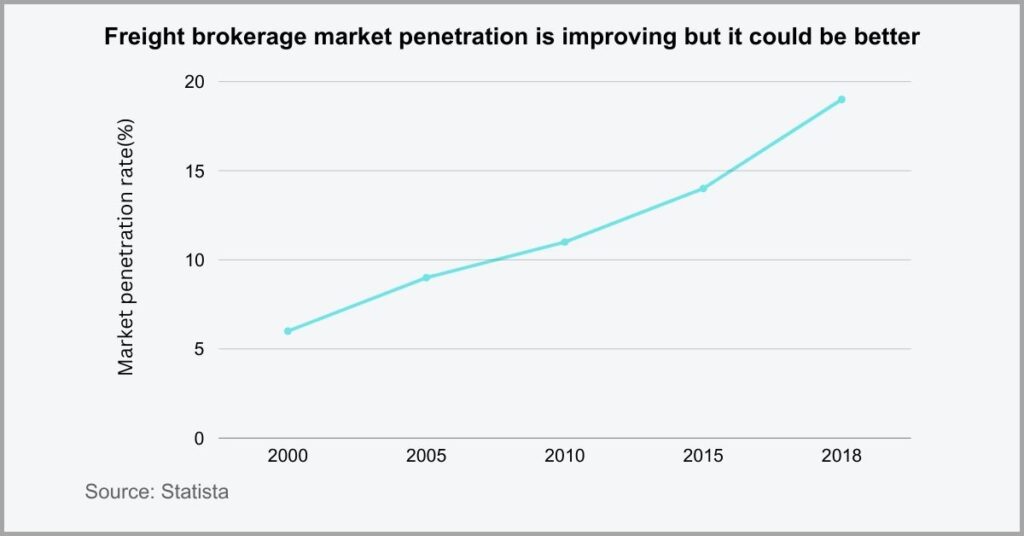
But how can you build a robust presence online?
You need to start by creating a professional and informative website showcasing services like specialized railroad logistics strategies, among others that you offer. This will help show you business to the world, and build trust with shippers and carriers.
It’s also important to optimize your website for search engines, and here I recommend partnering with a proven SEO partner to get dedicated expertise and experience.
They’ll help make your website responsive across devices, increase search engine rankings and ensure you reach the right market base with strategic keyword research and content marketing strategies that help you land more shipping clients.
Beyond SEO, you should also embrace other digital marketing strategies including social media, text and email marketing to diversify lead generation & increase success.
2. Expand your services
Are you specialized in select niches?
It’s tempting to focus on a certain category of services, which you’re probably most experienced in or have the most passion for. However, doing so is essentially putting all your eggs in one basket by increasing dependence on one market.
In addition, when you specialize in one service, this can limit your revenue earning potential and stall growth for your freight brokerage business.
A strong diversification strategy increases profits by 20% if the findings of a Cjournal study are anything to go by. The report adds that businesses who diversify enjoy better return on assets, and are more likely to survive industry disruptions.
So if you have just one speciality, I recommend making service diversification a key part of your freight brokerage strategies to help you widen the net.
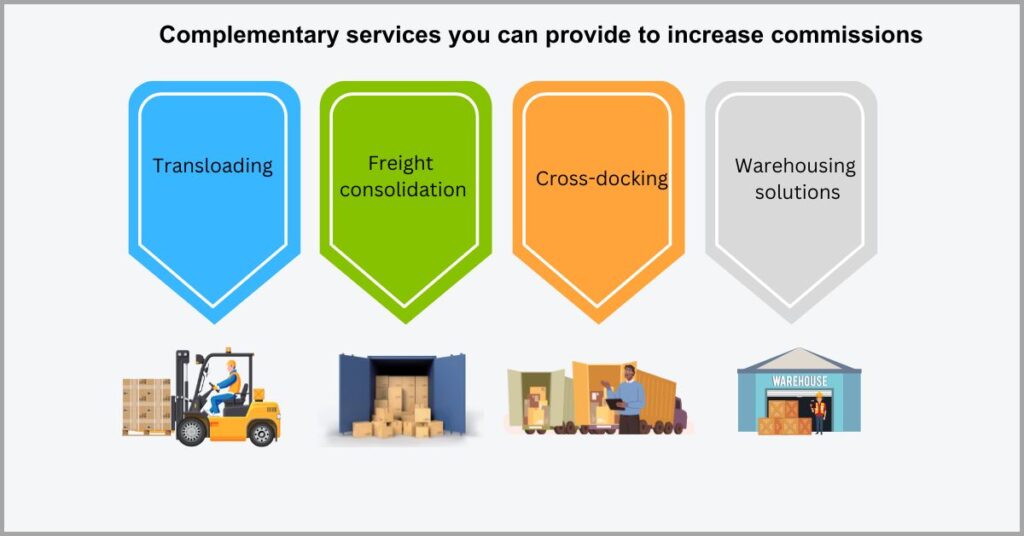
One way to diversify is to consider new markets.
For instance, if you primarily focus on providing freight brokerage for truckers, I recommend diversifying into other markets as well like air, rail and ocean freight to widen your net and increase your market base.
Another way to diversify your business is to provide value-added services that can create additional revenue and boost client loyalty.
For example, you can try out profitable warehouse business ideas like providing temporary storage and transloading services alongside your brokerage offer. This will anchor your core offerings with a service that’s important to your shipping customers.
Alternatively, if your area of expertise revolves around handling certain types of freight like containers or palletized goods, you should consider upskilling so that you can intermediate other different types of cargo like bulk goods and heavy machinery.
3. Improve your customer service
Customer experience is a strategic imperative today.
Understanding the unique needs of the carriers you partner with and the shippers who turn to you for assistance is key to building a strong reputation, attracting more referrals and generally remaining competitive in the freight brokerage industry.
Otherwise, failing to understand your clients’ needs makes it challenging to foster long-term relationships, and get repeat business from shippers & carriers.
A study by Salesforce established that 52% of B2B buyers, such as those who seek out freight brokerage services, said most customer experiences fall short. They added that they plan to leave most of these businesses in favor of competitors because of it.
In other words, providing great customer service offers a chance for you to increase your competitive advantage in the freight brokerage industry.
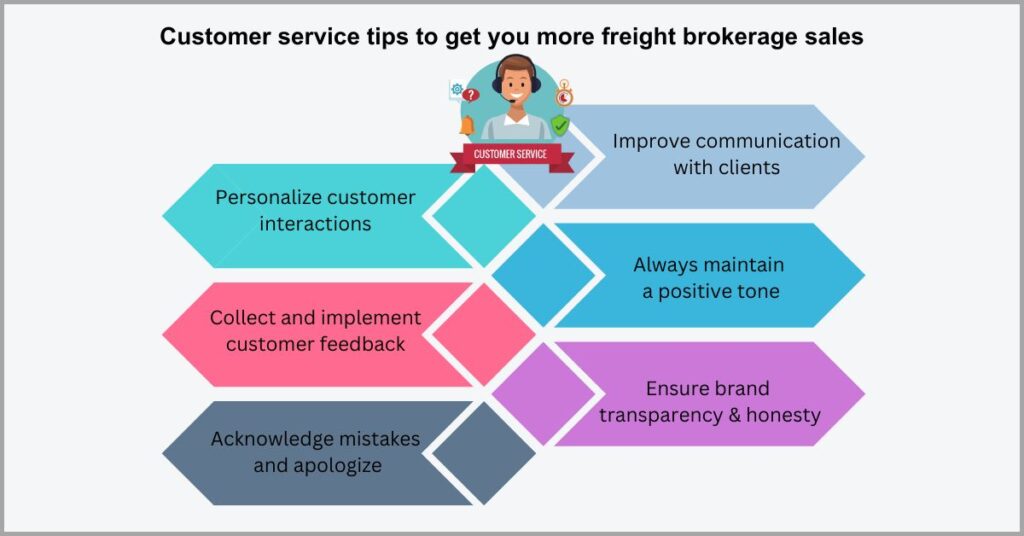
So how can you improve customer service?
Well, it first starts by implementing reliable and transparent communication to avoid keeping partners in the dark and also to get a better understanding of their needs. This also entails being clear about your terms and pricing to prevent misunderstandings.
You’ll also need to use different communication channels to reach all parties, including shipper clients, transloading and intermodal shipping carriers, and other partners to help coordinate and streamline shipping activities by keeping everyone informed.
It’s also important to solicit customer feedback via surveys and reviews, so that you can identify areas for improvement to help you get more positive reviews and referrals.
With the insights you’ll get from shippers and carriers, you can develop action plans to eliminate bottlenecks, enact process improvements and key market trends.
4. Invest in technology
What technologies do you use for your business?
If you want to be a successful freight broker, technology needs to be an important part of your workflow. Otherwise, inefficiencies will hurt your profit margins and even degrade shipper and customer experiences to taint your reputation.
You’ll also struggle to make data-driven decisions about your freight brokerage business, and key market trends and patterns can easily go unnoticed.
In fact, a survey by Decrates revealed that 40% of logistics services providers intend to invest in technology to streamline their operations. They view it as a key tool for automating various manual tasks to drive efficiency and improve business intelligence.
Many of them further credit it as a key differentiating factor in the freight brokerage industry, giving you yet another reason to embrace modern solutions.
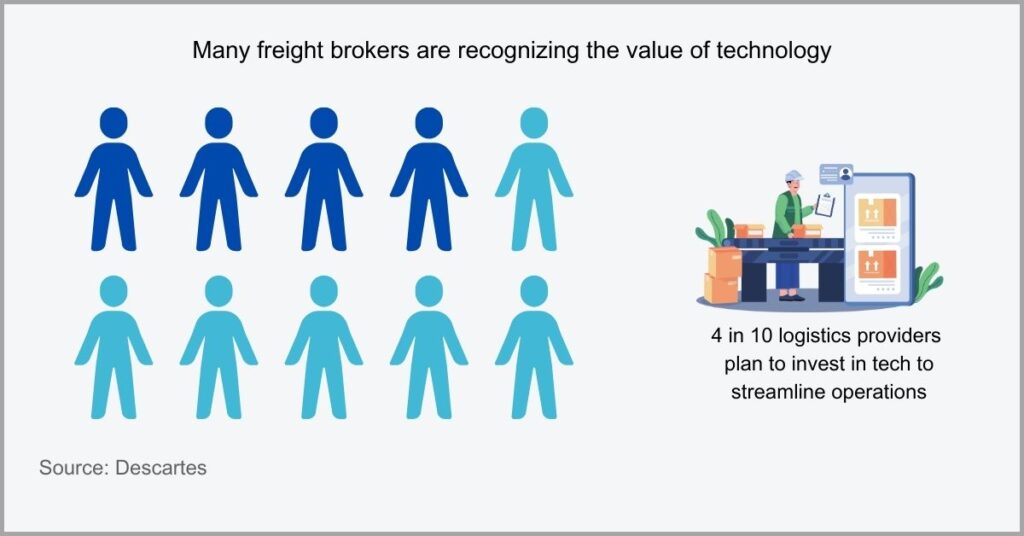
In terms of technology, I recommend investing in transport management solutions.
These tools are key to helping you select reliable carriers with the best rates that help realize profitable outcomes for your clients. They can also improve other aspects of your business, including route optimization and load scheduling.
There are many other tech innovations revolutionizing logistics today that you need to also make part of your freight brokerage strategies and they include cloud-based warehouse management systems (WMS).
WMSs are especially important if you also provide warehousing solutions for clients, because they can help you track inventory and shipments in real time to improve accountability and increase efficiency.
Furthermore, you should look into customer relationship management platforms.
These tools let you document interactions with carriers and shippers throughout each shipping cycle to improve collaboration and help personalize experiences.
5. Build your shipper network
Shipper’s are your logistics business’s lifeblood.
Without them, you’d essentially have no loads to help move and coordinate, and that means no work. Additionally, partnering with the right shippers is also key to ensuring continued business and increased growth as a freight broker service provider.
So consistently generating high-quality shipper leads and closing these deals is very important if you’d like to keep your doors open and increase success.
In 2024, getting shipper leads is very challenging for 51% of brokers, who said that they expect demand to generally flatten or decline in the coming months, according to a Truckstop survey. With demand falling, this means competition will be stiffer than ever.
It’s therefore important that you create a sustainable long term strategy for expanding your shipper network to help overcome demand dips and stay profitable.
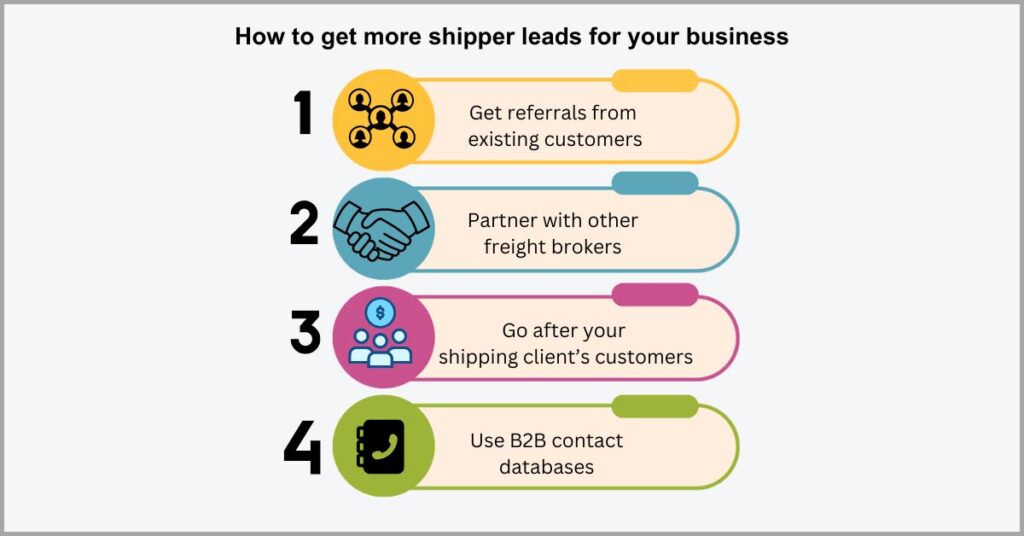
But how do you get high-quality shipper leads?
Well, before you look to new clients, you should first start by searching for opportunities for expansion with existing customers already sold on your services.
A client may be a subsidiary of a larger transload shipping service company, for example, and other auxiliary branches make for potential clients. So once you’ve built up a strong relationship, you should ask for referrals to other subsidiaries.
Furthermore, you also need to look up and down your supply chain. Your client’s clients can be a target here, but it’s important that you seek your customers go ahead first
I also advise reaching out to other freight brokers, who may have surplus work to spare or may need to outsource certain logistics aspects to a specialist like your business.
6. Seek out relevant partnerships
Building partnerships is also important to success.
As a freight brokerage business, you know that supply chains can have very complex needs that you may not fully meet on your own. It’s important to team up with the right partners who can readily step in where you fall short.
That said, poor business partnerships, where there’s a misalignment of priorities and resources, can create poor shipping outcomes and decrease revenue.
Partnerships are very important today for 76% of businesses, according to a study by Forrester. Survey respondents said that having the right partnerships in place is a key driver of generating revenue and feuling rapid business growth.
If you’re to make it in the fierce industry of freight brokerage, having the right partners in your corner is vital because it can help you increase capacity, resilience and reach.
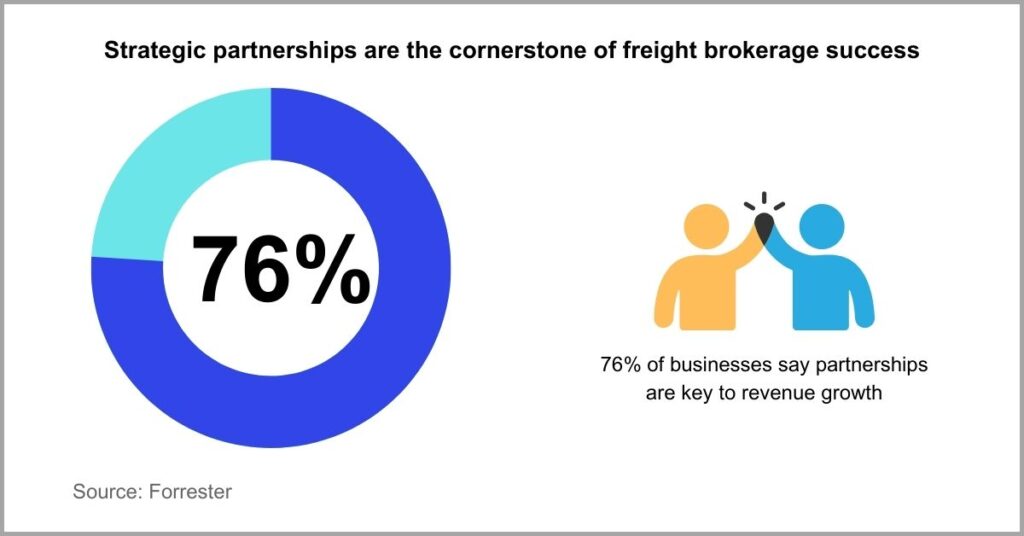
So how do you choose the right partners?
It’s all about addressing a dearth of expertise. For instance, if you’re an international broker, part of your freight brokerage strategies should incorporate customs brokers to ensure more accurate customs declarations and to assist with international logistics.
If you’re looking to set up a transloading yard as a value-added service, then you can partner with a company like transloads.co. Our premium support services can help you get and upskill staff, optimize yard operations and even land new clients.
On the other hand, you should also look into creating partnerships with distribution centers and warehouses along your shipping lanes to enable integrated logistics.
It’s also prodent to consider teaming up with logistics consultants, who can help optimize your operations and unearth revenue-driving insights.
7. Implement record-retention strategies
How do you track and store important documents?
You may handle a variety of shipping documents for clients, including bills of lading, cargo insurance certificates, and shipper-broker or broker-carrier agreements. Multiply this by the number of clients you have and record retention can be a huge burden.
If you don’t properly store and organize your documents, you may violate record keeping requirements by the Federal Motor Carrier Safety Administration (FMSA).
A survey by Denim revealed that 60% of freight brokers still rely on paper-based processes, involving paper checks and other shipper and carrier documents. This is a very inconvenient way to go about business because you can easily lose paper.
In addition to outright loss, paper also increases the risk of manual errors that can lead to mislabelling and misclassification, which only further hamper compliance efforts.
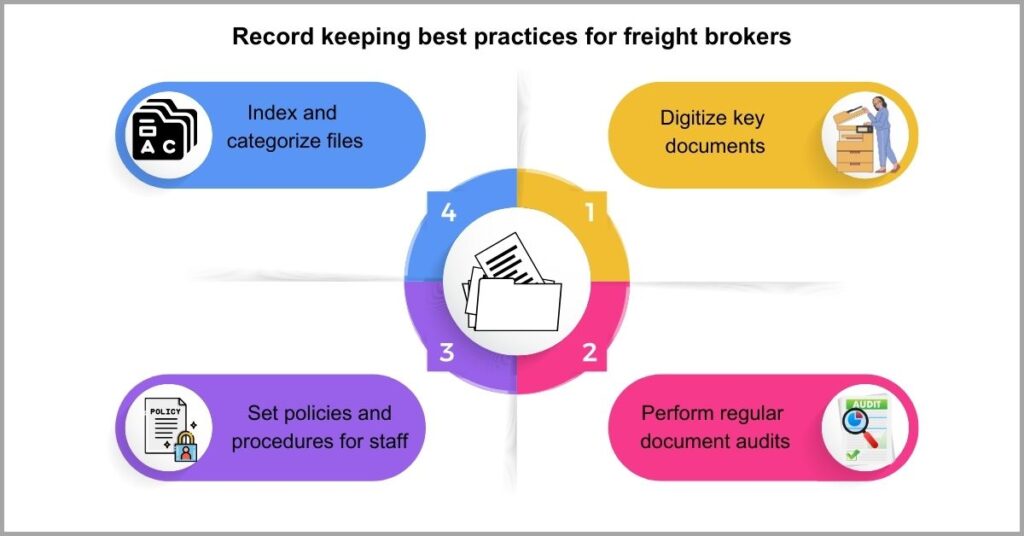
The first step to improving record-retention is implementing a document digitization strategy. This makes it easier to preserve documents long-term by avoiding the risk of loss and wear and tear that comes with traditional paper filing strategies.
In doing so, you can easily track and record important documents and carrier payments and hold on to transaction data better. So you can easily meet requirements by the FMSA, which mandate that you store certain documents for at least three years.
To achieve document digitization, the best transload management software can help.
These tools let you create electronic bills of lading and other documents, and allow you to store them in the cloud where third-parties like carriers can readily access them.
So beyond streamlining regulatory compliance, cloud-based document digitization will also increase your freight brokerage business’s efficiency and enhance collaboration.
8. Leverage multi-carrier networks
How diverse and reliable are your carriers?
The success of your freight brokerage business also depends heavily on how reliable your carriers are. Failures from carriers, like delayed shipments, also reflect poorly on your brand and can cause client dissatisfaction that eventually contribute to lost sales.
Additionally, a limited carrier network restricts your ability to meet the diverse shipping needs of your clients and can also increase shipping expenses.
You stand to save up to 36% of overall shipping costs with multi-carrier networks compared to single-carrier shipping, according to a study by Logistics Management. That’s a huge amount of revenue that can increase your commissions per project.
These savings typically arise from the ability to negotiate better carrier rates & mitigate supply chain disruptions like shipment delays that lead to costly disaster recovery.
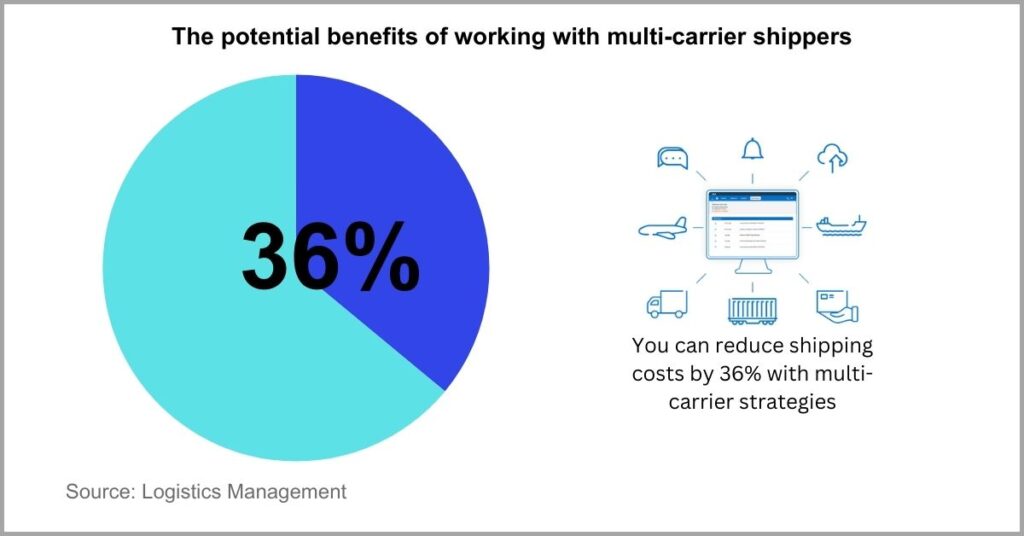
That said, you’ll need to reach out to different types of carriers depending on their expertise to meet present and future shipping needs of your clients.
For instance, you can work with the best transload service companies and carriers who provide both full truckload and less-than-truckload shipping services.
This will help you tend to shipping clients who have very small shipment volumes, and also factor in much larger players as well with much bigger logistical needs. With these types of carriers, you can accommodate both small and large-scale shippers.
Beyond meeting diverse shipping needs, diversifying carriers is also one of the most critical freight brokerage strategies for risk mitigation.
In case one carrier is unavailable or runs into trouble and they’re unable to complete shipping, you can easily switch to alternative carriers to minimize disruptions.
9. Increase your credit appeal
A great credit score is a critical success factor.
Potential lenders and even surety bond providers use this metric to assess whether you’re eligible to get credit in the first place. If eligible, it can also lead to very exorbitant loan interest rates.
When your credit score is poor, you’ll find it hard to secure funding for new projects, equipment and other needs of your freight brokerage business.
A survey by Fed Small Business indicated that 54% of brokerage businesses have poor credit scores, which in turn lead them to fail to secure funding. For those who did, these loans came at very high interest rates that really made it difficult to expand.
If you’re to ensure higher surety bond amounts and more favorable lending terms for your freight brokering business, you therefore need to work on your credit score.
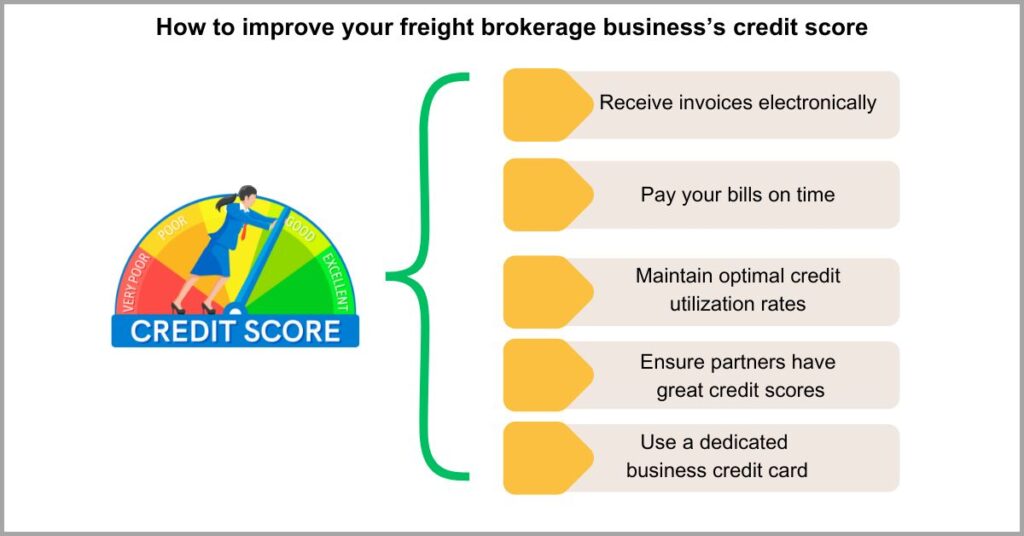
So how do you improve your credit appeal?
Paying invoices to carriers on time can improve your credit score, and having the right tools make this easier. One of the benefits of transloading software, for example, is that you get electronic invoices.
These can help you monitor and manage your cash flow better by helping you pay carriers on time, and also ensuring that shippers pay you on time too.
Additionally, I recommend separating personal finances from your business’s finances. This involves having a dedicated credit card just for your business, which can help you build a great credit history.
It’s also vital to keep your credit utilization low, preferably below 50%. For instance, if you have a $20,000 credit limit, I advise using not more than $10,000 of this credit.
10. Set the right broker rates
How much do you charge as a freight broker?
It’s tempting to charge really low when you’re starting out to attract more price-sensitive customers, however, this really undercuts your profits. On the other hand, charging too high can scare away potential customers and revenue.
When you fail to understand your costs and set the right price points, this can decrease your load revenue and eventually drive your business into the ground.
A study by Freight Waves revealed an 80% increase in commission earnings for freight brokers who set the right rates. These businesses were able to increase profits by understanding freight costs, keeping expenses down and understanding their worth.
So choosing the right pricing strategy for your business is one of the most important freight brokerage strategies to help increase revenue and growth.
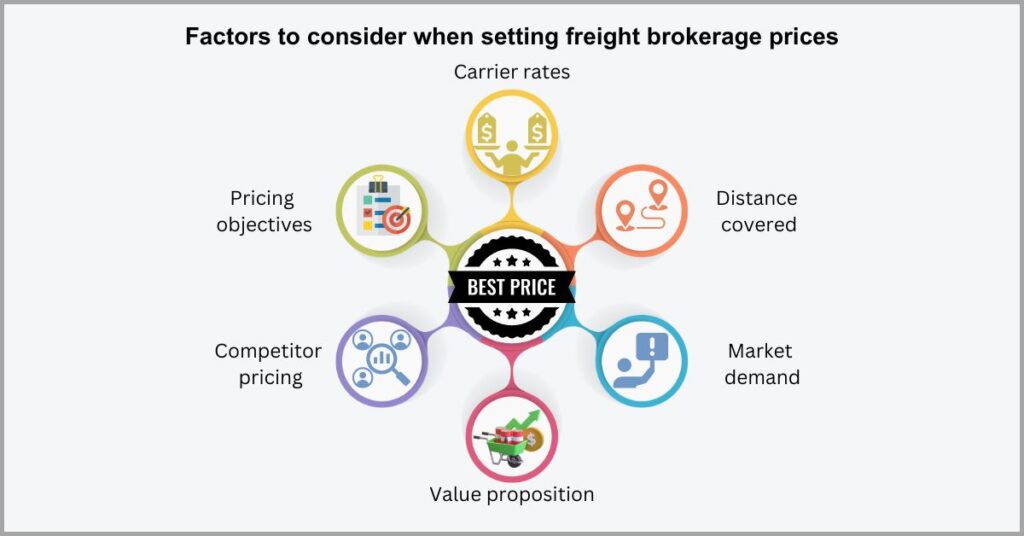
To help you find the right sweet spot, I recommend a flexible pricing strategy over a flat rate formula which can constrict earnings by not accommodating unique project needs.
This begs the need for comprehensive fraud audits before each project to help know your freight costs in and out.
When conducting a freight audit, you want to map a shipment’s pathway across the supply chain and even predict other additional services that it may require to help ensure appropriate remuneration.
If the shipment will need to switch modes from rail to truck, for example, this means you’ll need to work with transload service companies and that attracts additional costs.
With freight audits, it also becomes easier to find carriers with better rates and identify other cost-saving opportunities that can help you to massively increase load revenue.
Conclusion
Freight brokerage is very competitive.
There’s certainly no shortage of options, which is why you need to exceed customer expectations.
Most of your clients are typically looking for reliable partners with a track record of success and one who can deliver the best carrier rates for their business.
In fact, a BCG study revealed that 65% of executives prioritize supply chain cost reduction, due to competitive pressure. So it’s understandable why they’ll prioritize reliable freight brokers who deliver excellent cost-savings.
By establishing a robust presence online, diversifying your services and increasing customer service quality, you can grow your business. As a result, this will increase your bargaining power, enabling you to negotiate great carrier rates and meet client needs.
Implementing these freight brokerage strategies also improves resilience and stability for your freight brokering business.
It’ll help you identify opportunities for innovation, and generally improve your resilience and adaptability in navigating economic downturns and market fluctuations.

